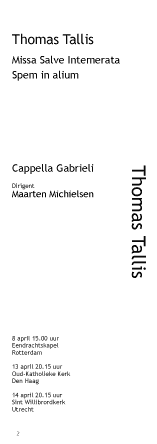Thomas Tallis (11-part Spem in alium)
3:00 pm, Sunday, 8 April 2018
Eendrachtskerk, Eendrachtsstraat 95, 3012 XH Rotterdam (map).
8:15 pm, Friday, 13 April 2018
Oud-Katholieke kerk, Juffrouw Idastraat 7, The Hague (map)
8:15 pm, Saturday, 14 April 2018
Sint Willibrordkerk, Minrebroederstraat 21, 3512 GS Utrecht
(map)
Entrance €17,50
Advance sales: €15,00 + transaction costs via online ticket sales
Advance sales: €15,00 via de koorleden
The Rotterdam Choir Project, which would later become Cappella Gabrieli, included Palestrina’s Missa Brevis and Thomas Tallis’ Lamentations of Jeremiah. This was in June 1986. Since then, our programming has frequently featured Palestrina’s music. Tallis, however, has remained unjustifiably neglected. The quality of Tallis’ work is comparable to that of Palestrina, Josquin des Prez, and William Byrd, as well as a number of other illustrious colleagues.
We now, therefore, devote an entire programme to this special composer.
The reason to do this now is the recent appearance of two special editions of his work: a reconstruction of an extraordinarily beautiful and elaborate motet and the mass based on it, Salve Intemerata (both for five-part choir), and a wonderful arrangement of the 40-voice motet Spem in alium.
Salve Intemerata
The motet Salve Intemerata comes from a collection of motets by various composers. However, this collection only survives in part-book form: not as a complete score but as a collection of separate part books. The book containing the tenor part has been lost from this collection. Until recently, this collection, the Peterhouse part-books, was only mentioned in dissertations, but was not performed. Fortunately, the missing part has now been reconstructed.
In this programme we combine the motet Salve Intemerata with the five-part mass that Tallis based on the motet. The first part, the Gloria, consists almost entirely of material from the motet, but as the piece progresses Tallis increasingly develops the musical quotations in new ways.
Spem in alium
Spem in alium is, together with the Lamentations, perhaps Tallis' most famous work, not least because of the scoring: eight five-part choirs, 40 voices in total. Unfortunately, that is also often the only thing that people have to say about this piece. The fact that it is also a masterly and extremely refined composition usually escapes mention.
This may well be due to how overwhelming the 40 parts are. After all, the spatial effect dominates the listener’s experience because tradition demands that the choirs surround the audience. As soon as they start to sing, the singers themselves are not properly able to hear the other choirs or thus the composition.
11-part arrangement
These problems were reason enough for Mick Swithinbank to make a chamber music arrangement of this great piece: reducing 40 parts to eleven. Nevertheless, the audience hears all of the notes and thus also the structure and special effects that Tallis created for the text.
As a singer, you can finally really hear the piece. This is like what Schönberg and Webern later did with Mahler’s great works: thinning the score’s weight suddenly makes details audible. The result is a joy for the audience and now also for the singers!
Cappella Gabrieli is directed by Maarten Michielsen.
Programme - Thomas Tallis (1505-1585)
Salve Intemerata (motet)
Missa Salve Intemerata
interval
Spem in alium
Candidi facti sunt
Quod chorus vatum
Jesu salvator saeculi
O salutaris hostia
Loquebantur variis linguis
Videte miraculum
